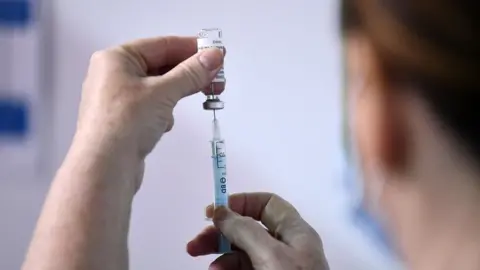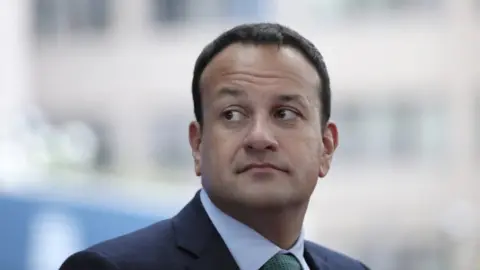Coronavirus: Ireland 'on course to ease restrictions in May'
 Reuters
ReutersIrish government ministers have insisted that the Republic is on course to continue a cautious reopening of society in May and to meets its end of June vaccination target.
On Tuesday, Irish public health officials restricted the use of the AstraZeneca vaccine to the over-60s.
There have been concerns about rare cases of blood clots.
That was followed by the Johnson and Johnson decision to pause the roll-out of its one-dose Janssen vaccine.
For both Oxford-AstraZeneca and Johnson and Johnson (J&J), the blood clot side effects are extremely rare.
Taoiseach (Irish PM) Mícheál Martin has said he expects 80% of the adult population to be offered or to have had a first dose by the end of June and around 55% to be fully vaccinated.
Public health officials have indicated that the Oxford-AstraZeneca vaccine was to account for about 20% of vaccinations and Janssen for about 15%.
But Mr Martin has said the European Commission announcement that the Republic is to get an unexpected extra 545,000 Pfizer-BioNTech doses puts the roll-out "on track in terms of key targets".
Perhaps of more significance in the longer run are the indications that the commission will in future concentrate on getting Pfizer-BioNTech supplies rather than other those from other vaccine manufacturers.
The taoiseach estimated that the Republic's vaccination programme is about a month behind Northern Ireland's.
Irish Minister for Foreign Affairs Simon Coveney said that people who refuse the vaccine offered to them put themselves "to the back of the queue".
"If you decide not to take up the vaccine that's offered to you when it's offered, well then you're essentially putting yourself to the back of the queue until everybody else gets vaccinated, which will certainly take quite some time," he told RTÉ's Today with Claire Byrne.
He said the safest thing to do is take the vaccine offered.
He said the Oxford-AstraZeneca vaccine was safe, particularly so "for people over the age of 60, in the context of the threats they face from Covid".
'Longest lockdown in the world'
From Thursday, those aged between 65 and 69 can begin to register online and by phone to make a vaccination appointment.
 EPA
EPAThe Tánaiste (deputy prime minister) Leo Varadkar has said he believes the state "is still very much on track" to meet its vaccination targets and to reopen society cautiously from the middle of next month.
The Republic has been described as having the longest lockdown in the world.
Also from Thursday those arriving from an additional 16 countries, including France, Italy, the United States and Canada, will have to undergo mandatory hotel quarantine.
There are now over 70 countries or territories on the Republic's list and people travelling from there must pay close to €2,000 (£1,737) for their 14-day-stay in a hotel.
Travellers are encouraged to book in online in advance but because there has been a higher number than expected of "walk-ins" the state has had to temporarily pause its booking system for a number of days.
 Reuters
ReutersOpposition parties, including Sinn Féin, believe that all people arriving by air and sea should undergo mandatory hotel quarantine.
But the measure has proved controversial particularly for those who are fully vaccinated and seeking to see sick or dying relatives.
Because the Republic of Ireland shares an unhindered border with no checkpoints, Mr Varadkar said he "envisages" that in future travellers will fly to Belfast and cross the border to avoid a mandatory hotel stay.
All counties in the Republic of Ireland are currently on Level 5 restrictions.

The groups currently being vaccinated against Covid-19 in the Republic of Ireland are:
- People aged 65 years and older who live in long-term care facilities (Group 1)
- Frontline healthcare workers (Group 2)
- People aged 70 and older living in the community - at different stages (Group 3)
- People aged 16 to 69 who are at very high risk (Group 4)
The next groups to be offered COVID-19 vaccination are:
- People aged 65 to 69 at high risk (Group 5) - registration opens on 15 April
- Other people aged 65-69 (group 6) - registration opens on 15 April
- People aged 16 to 64 who are at high risk (Group 7)
A total of 325,243 people had been fully vaccinated against Covid-19 in the Republic of Ireland by Tuesday, the latest figures show.
Some 769,721 first doses have been administered.

